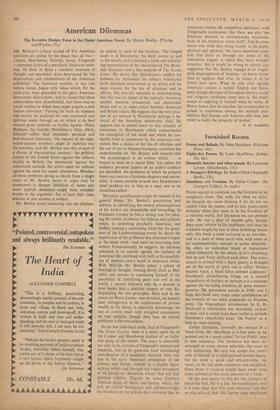American Dilemmas
MR. BEWLEY'S critical studies of five American novelists are united by the thesis that all five— Cooper, Hawthorne, Melville, James, Fitzgerald —represent facets of a peculiarly American prob- lem. He finds in them a common structure of thought and emotional drive determined by 'the deprivations and confinements of the American condition.' The American novelist, at any rate before James, began with 'ideas which, for the most part, were grounded in the great American democratic abstractions. And he found that these abstractions were disembodied, that there was no social context in which they might acquire a rich human relevance.' Turning his back on manners and society he analysed his own emotional and spiritual needs through an art which at its best created great symbolic or mythic figures—Natty Bumppo, Jay Gatsby, Huckleberry Finn, Ahab, Ishmael—rather than intimately personal and individuated characters. The essence of the nine- teenth-century novelist's plight in America was his isolation, and Mr. Bewley sees this as part of a cluster of characteristic tensions: the political loyalty to the United States against the cultural loyalty to Britain, the democratic against the aristocratic outlook, the artist's need for solitude against his need for social relatedness. Whether all.these problems spring as clearly from a single cause as Mr. Bewley seems to argue may be questioned—a sharper definition of terms and more explicit statement might have revealed breaks in the argument—but a( least their close relation to one another is evident.
Mr. Bewley enters sensitively into the dilemma
he detects in each of his novelists. The longest study is of Hawthorne, his short stories as well as the novels, and it includes a fresh and stimulat- ing interpretation of the obscurities of The Blithe- dale Romance and a fine analysis of The Scarlet Letter. He shows that Hawthorne's conflict lay between his inclination for solitary withdrawal (with detached observation as an artist) and his deep concern for the ties of affection; and he affirms, but scarcely succeeds in demonstrating, that this was an aspect of the typically American conflict between aristocratic and democratic ideals and so to some extent between American and British values. He suggests that the very prac- tice of art seemed to Hawthorne perhaps a be- trayal of the American democratic ideal. He appears not to attend much to that element of narcissism in Hawthorne which contaminated his conception of the artist and which he con- stantly tried to counteract by the conscious con- viction that a denial of the ties of affection and the use of art to distance humanity constitute the unpardonable sin. Mr. Bewley well remarks that 'the psychological is an avenue which . . . is bound to issue on a moral field,' but unless the ordinary personal aspects of an artist's conflicts are identified, the problems in which he projects them may assume a factitious elegance and univer- sality. It seems possible to hold that Hawthorne's chief problem lay in him as a man, not as 'an American author.
Whatever qualifications might be needed of his general theme, Mr. Bewley's penetration and subtlety in identifying the central preoccupations of his writers are dependable and 'rewarding. In Fenimore Cooper he has a strong case for relat- ing the artistic problems, the failures arid achieve- ments, to something peculiarly American, and besides making a convincing claim for the great- ness of the Leatherstocking novels he shows the importance of the problems that exercised Cooper in the lesser work—and went on exercising later writers. Fundamentally, he suggests, the dilemma consisted in an animus against the surfaces of American life combined with faith in the possibili- ties of America and a belief in American virtue. With Melville Mr. Bewley enters a sphere of theological thought, viewing Moby Dick as Mel- ville's one success in convincing himself of the possibility of identifying good and evil in the world, a success followed only by a descent in later books into a nihilistic despair of ever dis- tinguishing the two principles. Here and in the essays on Henry James—one of which, on James's later unhappiness at the implications of private wealth in the States, is especially interesting—he can of course make only marginal annotations on vast subjects, though they bear on crucial problems in the two authors.
In the last individual study, that of Fitzgerald's The Great Gatsby, there is a sense again (as in the Cooper and Hawthorne studies) of an inclu- sive grasp of the author. The essay is admirable not only in its analysis of Fitzgerald's method and intention, but in its generous (and convincing) identification of a continuity between what was fine in the early American conception of the pioneer and Gatsby himself as a mythic figure seeking within and through the vulgar prosperity of his period an 'American dream' that still had spiritual validity. Equally he notes Gatsby's 'insecure grasp of social and human values, his lack of critical intelligence and self-knowledge, his blindness to the pitfalls that surround him in
American society, his compulsive optimism,' with Fitzgerald's implication that these are also 'de- ficiencies inherent in contemporary manifesta- tions of the American vision itself.' And he com- ments that while they bring Gatsby to his death, physical and spiritual, 'the more important ques- tion that faces us through our sense of the immediate tragedy is where they have brought America. But it would be wrong to convey any suggestion that Mr. Bewley engages in an Anglo- phile disparagement of America—he knows better than to suppose that what he values is to be found here now. What he sets over against American culture is neither English nor Euro- pean, though elements of European literary, social and religious traditions enter into it. He might accept as applying to himself what he writes of Henry James, that he searches 'for a reality that is poised in suspension among the multiple pos- sibilities that Europe and America offer him, but which is really the property of neither.'
D. W. HARDINU


































 Previous page
Previous page